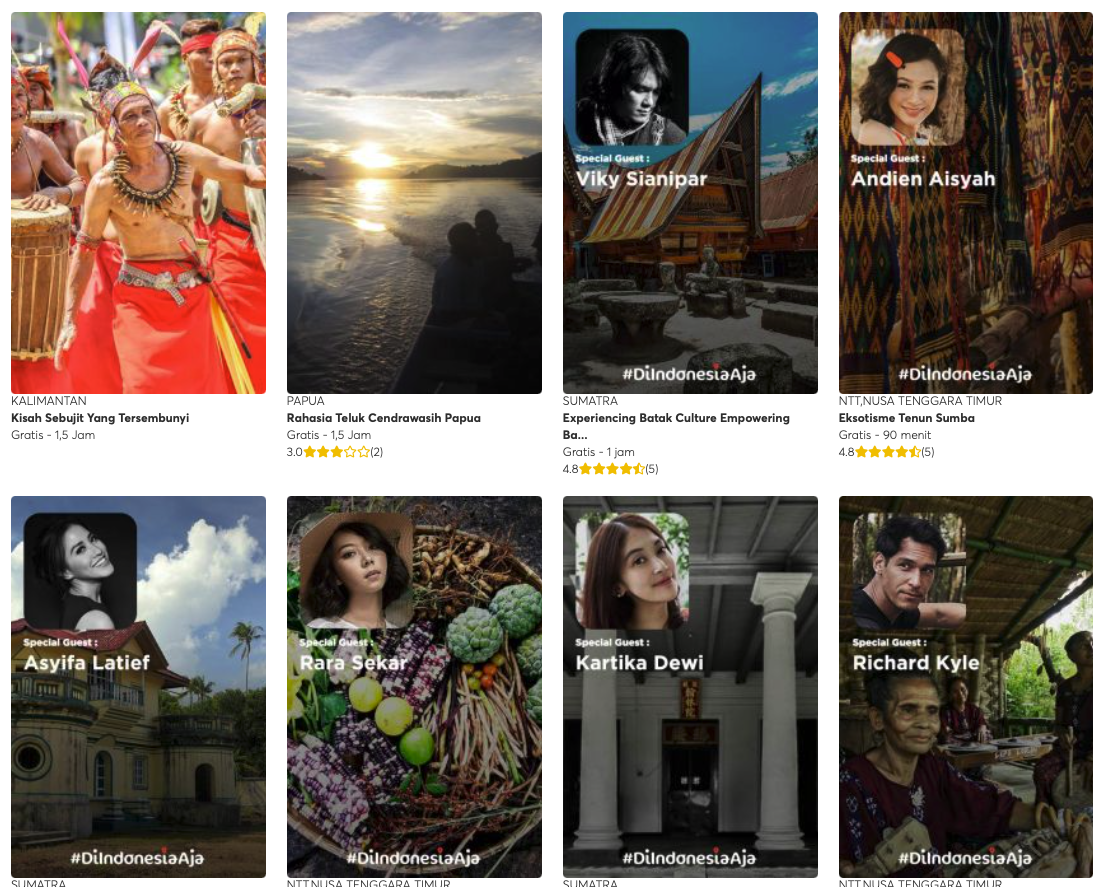Like other countries around the world, Indonesia’s tourism sector took a severe hit from the Covid-19 pandemic. The country saw a 68% year-on-year decline in online travel sales in 2020, according to the 5th edition of the e-Conomy SEA report by Google, Singapore state investment fund Temasek and management consultancy Bain & Company.
While local tourism continues to struggle, some travel companies are trying creative solutions to survive. One such company, Traval, switched to offering customers virtual trips via Zoom and YouTube, where travelers can go on “holidays” from the comfort of their homes. Called Traval LIVE, the first batch of such tours ran for three weeks in November 2020 covering locations such as Mount Rinjani in West Nusa Tenggara, Borobudur Temple in Central Java, Toba Caldera Geopark in North Sumatera and Komodo Island.
“Initially, it was very hard to convince travelers to adapt to the new concept," CEO and founder Julius Bramanto told CompassList in an interview. But with the help of travel experts, Traval managed to create a virtual experience that “at least satisfied that sense of getting away from routine, if only for a few hours.”
Traval was born out of a YouTube travel channel created by Bramanto, who is also a travel photographer. He was joined later by friends and fellow travel enthusiasts Rahman Trimulyana (COO), Aria Wijaksana (CCO) and Elyufial Dien (Chief of Product Development), each with more than 20 years’ experience in the travel industry.
The founders wanted to encourage local travel to areas beyond Java and Bali. They also wanted to promote activities such as mountain camping, traditional fire healing rituals and the learning of traditional music instruments with the locals.
Traval received its first funding in March 2018 for an undisclosed amount from angel investors. It was officially launched in November 2018. Currently, almost all of Traval’s revenue comes from Traval LIVE, which the company expects will be profitable by April 2021 .
Beyond the pandemic
Despite the word “LIVE,” some videos in Traval LIVE are pre-recorded. The live streaming is on Traval‘s website and app, as well as the YouTube page of Wonderful Indonesia, the official website of Indonesia Tourism. Each video runs for between 40 and 120 minutes, with prices ranging from nothing (free) to INR 135,000. Traval LIVE’s virtual tours are guided by experienced, paid hosts, some of whom are Indonesian celebrities, such as singers Andien Syah and Viki Sianipar, well known for their desire to travel.
“It is a direct solution to the challenges we face during this pandemic,” Bramanto said. “All of our local partners are suffering and need to remain active and productive while still promoting their destinations and services. By launching Traval LIVE we can keep them busy and provide them an income to survive this pandemic,” he added

Bramanto said Indonesia’s good internet connectivity, even in remote areas, helped to increase the number of Traval LIVE users, but he declined to provide the number of users. "It was also responsible for making the Ministry of Travel and Tourism take notice of the company,” he added.
The Ministry helped by promoting Travel LIVE in its social media platforms, website and networks and also sponsored some of the virtual tours, such as Virtual Heritage and Virtual Indonesia, enabling Traval to provide these tours for free. Traval has also partnered with Garuda Indonesia's budget airline Citilink and many travel agencies around the country.
Bramanto acknowledged that Traval LIVE’s virtual tours may not be ideal for hardcore travelers who make up its primary market, but he considers it a “tangible effort at satisfying travelers' thirst and saving tourism during an unprecedented time.” For now, Traval LIVE is a Covid-19-era measure, but it may, according to Bramanto, continue beyond the pandemic.
Safe, sustainable tours
Traval also promotes a Covid-safe but non-virtual travel product called “Safecation,” which is a private tour for families or a group of friends. Launched in December 2020, these tours avoid crowded tourist spots and are held with strict Covid-19 protocols, requiring travelers to first register for a CHSE (Cleanliness, Health, Safety, Environment Sustainability) certificate issued by the tourism ministry.
The company also runs a tour called Zero Waste Journey, a back-to-nature trip where travelers do not bring along any items made from plastic and plant trees during the tour to offset their carbon footprint.
According to Bramanto, Safecation tours are still on offer, but, due to the pandemic, very few have been booked despite growing interest among travelers for responsible and sustainable tourism products.
“Since the very beginning, we set ourselves apart from the competition by differentiating our products from non-mainstream travel. We focus on adventure travel where we have competitive advantages in knowledge and experiences,” Bramanto said.
“We are also developing volunteer tourism, in which travelers can participate in local projects to protect the environment or local culture. Hopefully, we can launch this project soon,” he added.











